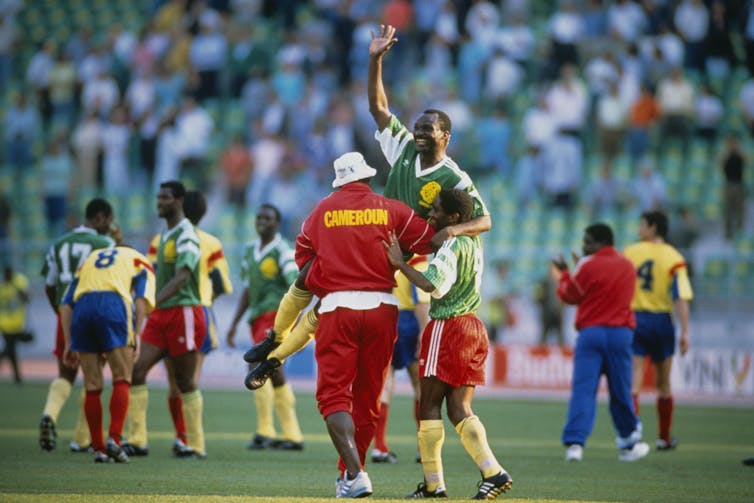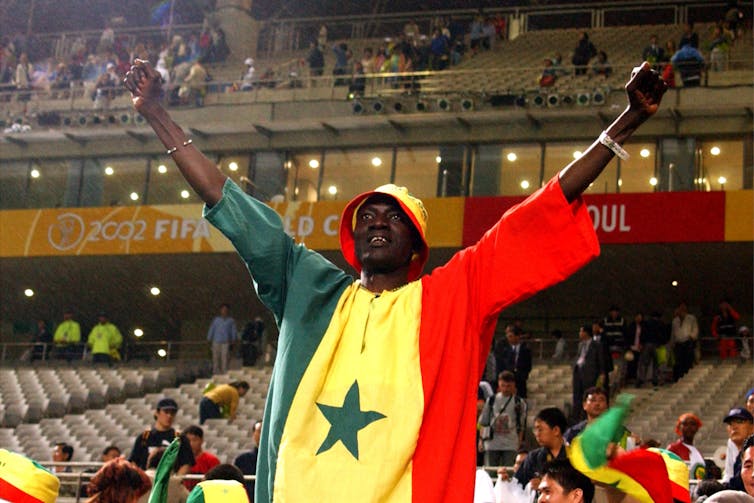
Wycliffe W. Njororai Simiyu, University of Texas at Tyler
Growing up in Sirisia on the slopes of Mount Elgon in Bungoma, Western Kenya, soccer was and remains a major pastime for young boys, whether herding livestock or in school.
Their conversations at dinner tables and busy markets focus on match outcomes, the on-field brawls, assaults on rival fans or on the referee, the controversial goal from an offside position, the penalty that was not supposed to be a penalty, the rivalry between local teams. These conversations are at the core of the culture and evolution of association football or soccer in Africa.
Indeed, it is the memories that people take away from the game that spice conversations and deepen peoples’ connection to the sport. And that’s particularly true of a FIFA Football World Cup tournament, held every four years.
As FIFA World Cup Qatar 2022 draws near, the 40 African nations battling for a spot have to plan beyond just making it. Some of the favourites include Algeria, Côte d'Ivoire, Senegal, Cameroon, Egypt and Morocco – given their large contingent of professionals in top European leagues. The pairings in the qualifiers look exciting.
Past performances by African teams at the FIFA World Cup have not yielded a trophy. However, as I outline in a research paper, there have been memorable and defining moments at each FIFA World Cup tournament that inspire hope for a breakthrough, perhaps even at the 2022 tournament in Qatar.
Africa and the world cup
Despite the enormity and diversity of the African continent, home to 54 countries that are members of FIFA (the Fédération Internationale de Football Association), the passion for the beautiful game is universal.
This tournament brings together the best players from around the world representing their national teams. It has grown from eight teams that gathered in Uruguay in 1930 for the inaugural edition to 32 nations in Russia in 2018 and is set to increase to 48 in 2026.
To date, only 13 African nations have qualified and participated in the World Cup Final tournament: Cameroon (7 times), Nigeria (6), Morocco (5), Tunisia (5), Algeria (4), Côte d'Ivoire (3), Egypt (3), Ghana (3), South Africa (3), Senegal (2), Zaire (1), Angola (1) and Togo (1). Egypt were first, in 1934, the rest followed from 1970 onward.
Africa’s participation in the tournament is characterised by numerous challenges, unexpected victories and dramatic failures. Indeed, the performance on the field has provided great moments of excitement, athleticism, talent and skill – but also moments of tactical naivety and indiscipline.
There are, of course, others, but I outline 10 defining and memorable moments in my paper. In this context, “memorable” means moments in the tournament that stood out in terms of attraction, style of play and legacy. On the other hand, “defining moments” are characteristics that revealed, tested and shaped the perception and trajectory of the African and global game of football.

10 significant moments
The formation of CAF, the Confederation of African Football, in 1957, and with it the solidarity that led to the boycott of the 1966 World Cup tournament. This was due to just one final spot being available for the whole of Africa and Asia.
1970 FIFA World Cup: Morocco becomes the first team post the 1966 boycott to qualify and represent Africa.
1974: Zaire becomes the first sub-Saharan country to qualify and represent Africa – even as they concede a record nine goals in one match.
1978: Tunisia registers the first African win at the tournament – defeating Mexico.
1982: Algeria beats West Germany and Cameroon remains unbeaten, leading to additional slots for Africa at future Football World Cups. It takes Austria and West Germany colluding to have Algeria eliminated.
1986: Morocco leads the table in a pool including England, Portugal and Poland but lose in the second round to West Germany.
1990: Cameroon’s “Indomitable Lions” qualify for the quarter-final and Roger Milla’s individual exploits.
2002: Senegal’s “Lions of Teranga” show up to beat defending world champions France and qualify for the quarter finals.
2010: South Africa host the Football World Cup, inspire the world with the vuvuzela and a missed penalty in the 90th minute that cost Ghana a place in the semi–final.
2014 and 2018: indiscipline, naivety, and technical retrogression characterise the African teams.
Will Africa ever win the cup?
The occasional brilliance, technical display and aggressive physical expression of African football talent at the cup has earned admiration, enthralled spectators and drawn many African children to soccer. However, as the 2018 FIFA World Cup showed, Africa still lags in the development of the game.
The question on many fans’ minds is: will an African team ever win the tournament? Egypt, Morocco, Tunisia, Senegal and Nigeria gave it a shot in 2018 in Russia but none made it to the second round. A combination of injuries to key players, indiscipline, poor game management, tactical naivety and lack of disciplined organisation led to their poor showing.
Moving forward, Africa has a long way to go. Indeed, African players need to be reminded that they stand on the shoulders of those who resiliently battled to continually expand the opportunities of future generations of African players. A few battles have been won, but the war still rages.
African players have proven that their skill and natural ability are on par with the best; they need a cohesive and stable footballing system to realise their potential. Addressing that elusive tactical naivety and discipline deficit at the highest levels of national sports governance and team management are issues begging for solutions for the continent to break the hitherto ceiling at the quarter final stage of the FIFA Football World Cup.
Read more: Meet the five teams hoping to change Africa's World Cup story
Looking to 2022, many memorable and defining moments in each tournament indicate there is hope for a breakthrough. The fact that the FIFA World Cup was successfully hosted by the African continent gives extra motivation for aspiring African teams. Indeed, the 2010 tournament demonstrated Africa’s progress on and off the field, passion for the sport and commitment to play a bigger role on the world stage. However, Africa must put structures and operational mechanisms in place to scale new heights. The fans deserve it.![]()
Wycliffe W. Njororai Simiyu, Professor, Health and Kinesiology, University of Texas at Tyler
This article is republished from The Conversation under a Creative Commons license. Read the original article.

